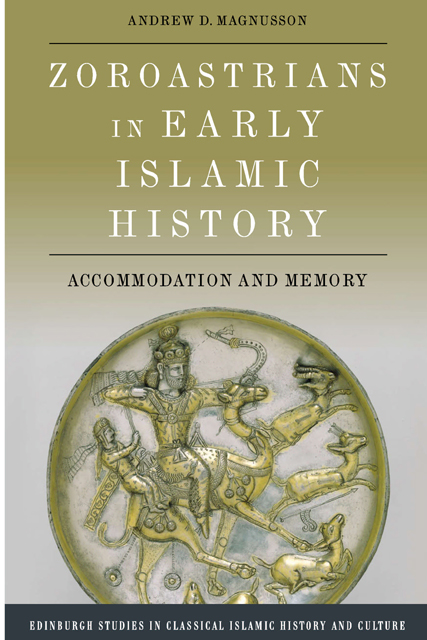Book contents
- Frontmatter
- Contents
- Acknowledgements
- A Note on Transliteration and Abbreviation
- Dedication
- Introduction: Zoroastrianism, Islam and Accommodation
- 1 Myth and Countermyth in Zoroastrian Historiography
- 2 Umar’s Dilemma: The Taxation of People Without a Book
- 3 Marriage, Meat and the Limits of Accommodation
- 4 Salman’s Charter as a Site of Memory
- 5 Fire Temple Desecration and Triumphal Tales of Violence
- 6 Rhetorical Zoroastrians in Early Islamic Discourse
- Conclusion: An Ambivalent Accommodation
- Appendix A Translation of an Iranian Recension of Salman’s Charter
- Appendix B Translation of an Indian Recension of Salman’s Charter
- Bibliography
- Index
4 - Salman’s Charter as a Site of Memory
Published online by Cambridge University Press: 25 April 2023
- Frontmatter
- Contents
- Acknowledgements
- A Note on Transliteration and Abbreviation
- Dedication
- Introduction: Zoroastrianism, Islam and Accommodation
- 1 Myth and Countermyth in Zoroastrian Historiography
- 2 Umar’s Dilemma: The Taxation of People Without a Book
- 3 Marriage, Meat and the Limits of Accommodation
- 4 Salman’s Charter as a Site of Memory
- 5 Fire Temple Desecration and Triumphal Tales of Violence
- 6 Rhetorical Zoroastrians in Early Islamic Discourse
- Conclusion: An Ambivalent Accommodation
- Appendix A Translation of an Iranian Recension of Salman’s Charter
- Appendix B Translation of an Indian Recension of Salman’s Charter
- Bibliography
- Index
Summary
In the wake of the Bombay Riot of 1851, Sorabjee Jamsetjee Jejeebhoy published a slender volume entitled Tuqviuti-Din-i-Mazdiasna (‘The Virtues of the Zoroastrian Religion’). Sorabjee was a member of the Parsi, or Indian Zoroastrian, community and the son of Jamsetjee Jejeebhoy, the wealthy merchant, philanthropist and Baronet of India. Sorabjee undoubtedly intended its publication to ease tensions between Muslims and Parsis after weeks of sectarian violence in Bombay. The book included a charter (N.P.,‘ahd-nāma) that the Prophet Muhammad had supposedly granted to the family of Salman al-Farisi in the seventh century. Salman was a Companion of the Prophet and a former Zoroastrian. The charter, written in Arabic, offered various fiscal and legal privileges to Salman’s brother and his descendants. The Prophet gave them full autonomy over their lands and fire temples, and urged Muslims to treat them kindly, regardless of whether they converted to Islam. Muhammad warned that Muslims who contravened his instructions would face divine retribution. This ahd-nama, sealed by the Prophet and witnessed by several of his Companions – including Salman – is dated Rajab of year 9 ah, or 631 ce.
This document routinely surfaces in the Parsi community of Mumbai during moments of interreligious tension as a panacea. Sorabjee Jamsetjee Jejeebhoy translated the ahd-nama into Gujarati in the wake of the sectarian Bombay Riot of 1851. The Iran League, a Parsi organisation dedicated to improving ties between Muslims and Zoroastrians in Iran and India, funded the first English translation in 1925. Jamshedji Saklatwalla rose to the charter’s defense in 1938 after an editorial in a Bombay newspaper questioned its authenticity. In 1991 the periodical Parsiana featured an acrimonious exchange between Ervad Darius Sethna and an Iranian scholar, Ali Jafarey. Sethna did not recognise Jafarey’s conversion from Islam to Zoroastrianism. As noted previously, conversion is a contentious issue in modern Zoroastrianism, particularly among Parsis. After Jafarey published an article questioning the use of bull’s urine in Zoroastrian rites of purificiation, Sethna suggested that Jafarey, whom he still considered to be a Muslim, would be ineligibile for such rites anyway. Sethna contemptuously urged Jafarey to study his own religion (Islam) and its scripture (the ahd-nama) instead. Just a few years later, in 1995, Mithoo Coorlawala offered the charter as an answer to religious extremism.
- Type
- Chapter
- Information
- Zoroastrians in Early Islamic HistoryAccommodation and Memory, pp. 78 - 111Publisher: Edinburgh University PressPrint publication year: 2022



